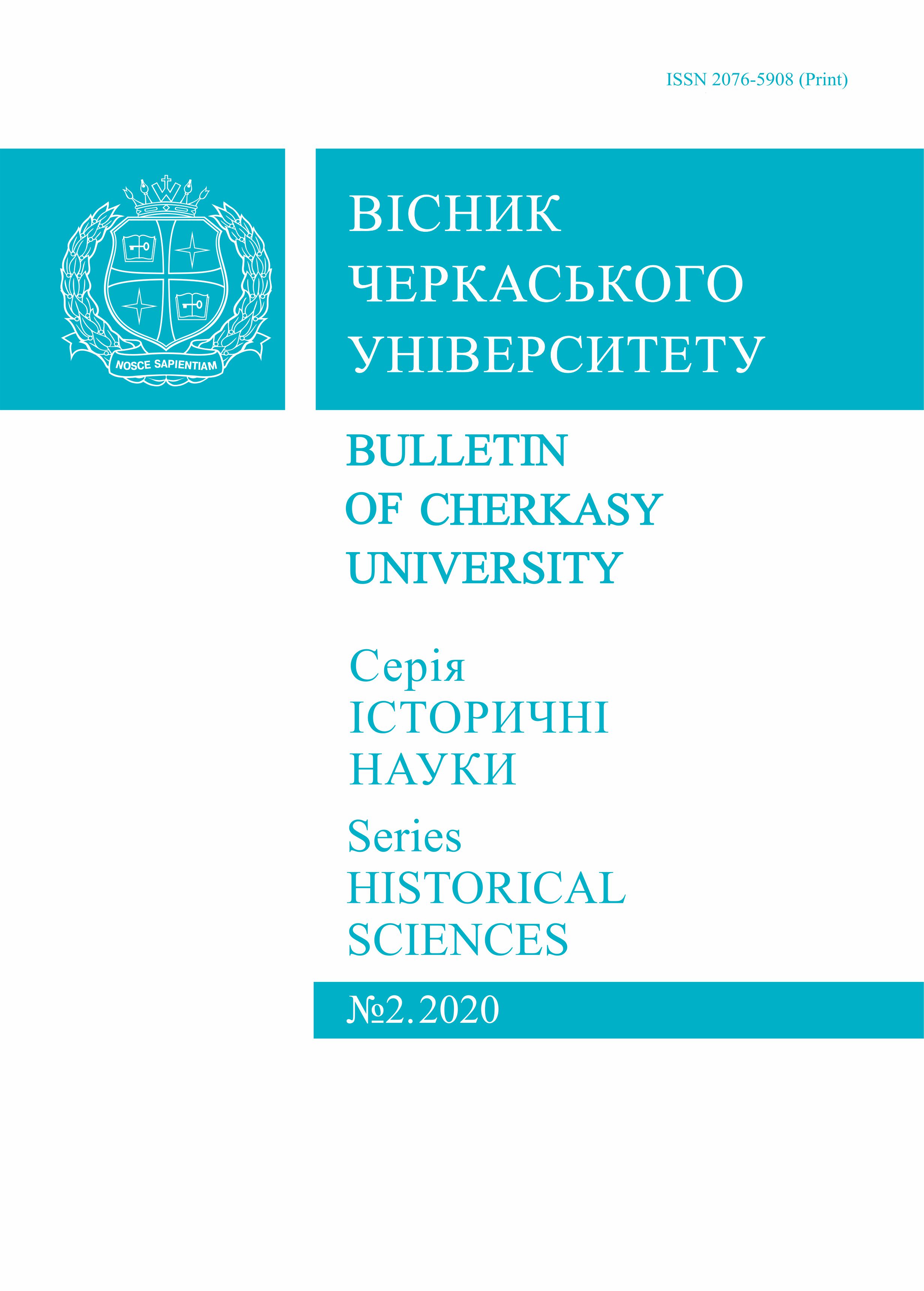Ukrainian-Swedish Union of the 1650s in the interpretations of Polish historians of the first half of the XX century
##plugins.themes.bootstrap3.article.main##
Анотація
Abstract Introduction. Formulation of the problem. The events of the middle of the seventeenth century are among the most important ones in the historical destiny of the Ukrainian and Polish peoples. The protracted war divided the peoples once united within a common state and led to their mutual exhaustion. The neighboring states also intervened in the military conflict, trying to use the Ukrainian and Polish sides to their advantage. In the history of the Commonwealth, the events of the second half of the 1650s were called the “flood”, when most of its territories were occupied by the armies of the enemy. However, the intervention of Sweden and Semyhorod opened up prospects for a new anti-Polish coalition for the Cossacks led by B. Khmelnytsky. These important events are reflected in the works of many Polish historians of the first half of the twentieth century and became the basis for a variety of historiographical concepts and assessments.
Purpose. The purpose of the article is to analyze the approaches of the Polish historians of the first half of the twentieth century to the assessments of the Ukrainian-Swedish union of 1656-1657 and their interpretations of the events of the Cossack-Semyhorod campaign against the Commonwealth.
Results (Conclusions). The events of 1655-1657 were among the most dramatic ones for the Poles in the history of their people, when their statehood was put on the brink of survival. The polish historians of the first half of the twentieth century made similar assessments, trying to show them both the facts of the tragedy and defects of the Polish-Lithuanian Commonwealth and heroic examples worth following by generations of Poles. The Ukrainian-Swedish military alliance attracted a lot of scientists’ attention. Many historians believe that the cause of all the troubles of Poland was B. Khmelnytsky whose urging provoked the Swedish invasion. The treaty between Charles X Gustav, B. Khmelnytsky and George II Rбkуczi was considered by some historians as an act of division of the Commonwealth, which became a prototype of the division of the Polish-Lithuanian state in the late eighteenth century. They also found significant prospects in it for the Cossack hetman, who, with the help of new allies, could finally defeat Poland and break free from the burdensome alliance with Moscow. The events of the Cossack-Semyhorod troops’ march to Poland also attracted considerable researchers’ attention. Those researchers who disliked the Ukrainian national movement often portrayed it as a destructive barbarian invasion. Many historians have emphasized that the failures of the Swedish-Semyhorod-Cossack alliance ruined B. Khmelnytsky’s plans, and the news of them hastened the death of the sick hetman.
Originality. The article managed to explore the peculiarities of interpretations by Polish historians of the union of the Ukrainian Cossacks led by B. Khmelnytsky, the Kingdom of Sweden and the Principality of Semyhorod directed against the Commonwealth. The approaches of researchers to the coverage of the events of the joint Semyhorod-Cossack military campaign of 1657 have been studied. The main tendencies of influence of political ideologies and historiographical directions on the assessments of the mentioned historical events sympathized with by some Polish scholars have been analyzed.
Conclusions. The assessments by Polish historians of the Ukrainian-Swedish military alliance and the struggle of the Commonwealth forces against the Cossack-Semyhorod troops were often influenced by various political ideas and historiographical concepts that were supposed to foster patriotism among Poles. Scientists also tried to explain a number of problems of the situation of the Polish people of those times with the examples of the past. The study of various myths and stereotypes which are rooted in the historical consciousness and a number of scientific works allows us to reassess the established historiographical constructions that do not correspond to modern scientific approaches.
##plugins.themes.bootstrap3.article.details##
Посилання
Ruda, O. (2008). Ukrainian Cossacks in the interpretation of Polish historians of the late nineteenth – first third of the twentieth century. Lviv (in Ukrainian).
Pestrikova, O. (2018). The Khmelnytsky era in the interpretation of the Polish historian Ludwik Kubala. Nddnipryansąka Ukrayina: istorychni protsesy, podiyi, postati, Dnipro. Naddnipryanska Ukraine: historical processes, events, figures, Dnipro. Vol.21. 2, 83–91. (in Ukrainian).
Romek, Z. (1997). Olgierd Górka. Historian in the service of pro-state thought (1908–1955). Warszawa (in Polish).
Kolbuszewska, J. (2011). Tadeusz Korzon (1839-1918). Między codziennością, nauką a służbą narodowi. Łódź: Wydawnictwo Uniwersytetu Łódzkiego (in Polish).
Korzon, T. (1912). History of wars and military in Poland. Pre-Partition Era. Kraków: Nakładem Akademii Umiejętności (in Polish).
Szelągowski, A. (1936). Universal History. Warszawa: M.Arct (in Polish).
Rawita-Gawroński, F. (1914). Cossacks hetman B. Chmielnicki; historical sketch of his life and struggle. Lwów: Wydawnictwo Tow. Im. Piotra Skargi (in Polish).
Jabłonowski A. (1912 ). History of South Rus until the fall of the Republic of Poland. Kraków: Akademia Umiejętności. (in Polish).
Tomkiewicz, W. (1939). Ukrainian Cossacks. Lwów: Państwowe Wadawnictwo Książek Szkolnych (in Polish).
Mościcki, H. (1936) General History. Vol. 3. Warszawa: Kultura i Wiedza (in Polish).
Sobieski, W. (1931) History of Poland. Kraków: Nakł. Tow. Skoły Ludowej (in Polish).
Konopczyński, W. (1936). The History of Modern Poland. Vol. II. 1648–1795. Warszawa; Kraków; Łódź; Poznań; Wilno; Zakopane: Skład Główny u Gebethnera i Wolffa (in Polish).
Kubala, L. (1917). Brandenburg War and Rakoczi’s invasion 1656-1657. Vol. 5. Warszawa: Nakład Gebethnera i Wolffa (in Polish).
Bobrzyński, M. (1927). History of Poland in outline. Vol.2. Warszawa; Kraków; Lublin; Łódź; Paryż; Poznań; Wilno; Zakopane: Nakład Gebethnera i Wolffa (in Polish).
Wasilewski, L. (1934) The Ukrainian question as an international problem. Warszawa: Prace Ukraińskiego Instytutu Naukowego (in Polish).
Smoleński, W. (1924) History of Poland. Warszawa: G. Gebethner i spółka (in Polish).
Rawita-Gawroński, F. (1907). An attempt at reconciliation with Rus. Bieniewski’s legation from the death of B. Chmielnicki to the Chadziacka agreement. Kraków: G.Gebethner i Spółka (in Polish).

